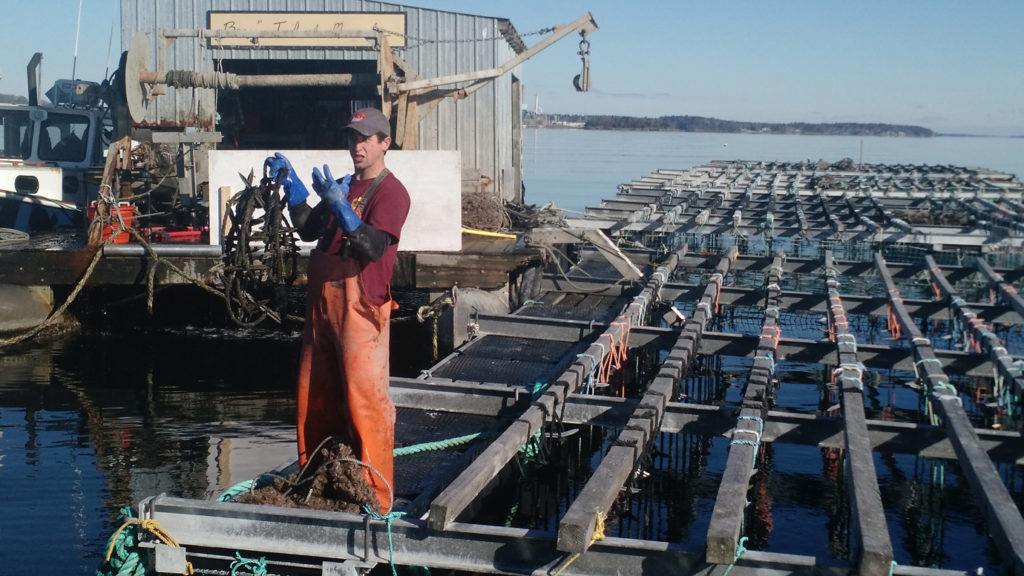9:30 a.m. Exiting the highway onto Franklin Street, I’ve got to admit I’m a little nervous. While we have been organizing this day for a month, a boat ride in Casco Bay at the end of January is never a sure bet, even when the forecast calls for sunshine and variable 5-10 kt winds. What if something unexpected rolls in? What if Jeff’s boat has a mechanical issue?
Today is “Industry Day” for our aquaculture business development group, and the plan is simple: bring a group of twenty prospective aquaculturists, hailing from six islands and six other mainland communities, together in Portland for a single day to tour as many aquaculture farms and meet as many industry members as possible.
While beautiful weather is a good thing, we also know that we are taking up valuable time on the water for those of our group that are fishermen: better make it worth it.
Additionally, Bri was our chief contact with Portland industry members until two days ago, when she gave birth to a baby boy. After hastily reading her emails, I am unsure which of this town’s busy aquaculturists will be able to join us when and where.

Getting on the boat in Portland
As I pull into the parking garage, a smile breaks across my face as I wave to one of our group members, a prospective kelp-farmer from North Haven hitching a ride down on the back of a golf-cart (the stairs are under construction). As we march towards the dock where Jeff’s boat, the Captain B, awaits, I see that Peter Stocks, owner of Calendar Island Mussels, is already on board and ready to join us for the entire trip. I get the feeling that this is going to be a good day.
11:00 a.m. We pull up to Bang’s Island Mussels in time to catch owner Matt Moretti and crew finish harvesting. While they are hard at work and the hydraulics are rumbling, John, one of his crew, is able to take the time to field questions from the group. Soon, he is showing us around the entire raft, pulling up lines so we can see the different types of rope, imported from as far away as New Zealand (see top image).
12:00 p.m. Peter Stocks directs us over to his own mussel rafts, a little further up the bay. As we approach, we see a shape that reveals itself to be Paul Dobbins, founder of the kelp growing company Ocean Approved, sitting peacefully in the sun. As we park on an adjacent raft, Paul hops in his Zodiac to join Peter as he brings up a row of experimental ear-hung scallops to our mouth-watering delight.
While it is no doubt stressful being at the cutting edge of the food industry, you couldn’t tell from listening to these two. They patiently answer all the group’s questions and give out words of wisdom on topics ranging from site selection to crop insurance.

Checking out the kelp with Paul Dobbins, at right
1:30 p.m. After a stop at Paul’s kelp farm, we head back to town, grabbing a quick lunch before marching over to the Bang’s Island processing facility. The crew is so hard at work washing, debyssing, and sorting the morning’s harvest that they barely notice our arrival. Matt takes an hour off to give us an extended tour around the building, one of the most important parts of the day for the four members of our group interested in growing mussels.
6:00 p.m. Finally, after a big afternoon of presentations by even more industry members, we head to Andy’s Old Port Pub, where we are treated to a dinner of…shellfish! The chef served us up heaping plates of mussels, pitting Maine product again Chile and Prince Edward Island…no surprise which one tasted the best.
Reflecting on the day, I am amazed just at how well it went, thanks almost entirely to the industry members who set aside such a large part of their valuable time to share their knowledge with those that in other industries would be labeled competitors.
Earlier in the day, Paul described the value of this sharing in practical terms, saying that the more people that join the industry, the more people he has to call up when things go wrong on his own farm, asking “have you ever tried this” or “has this ever happened to you?”
After listening to these aquaculturists speak, I get the feeling that an equal part of this spirit stems from the fact that they are passionate about their work, and like any passion, they want to pass it on.



